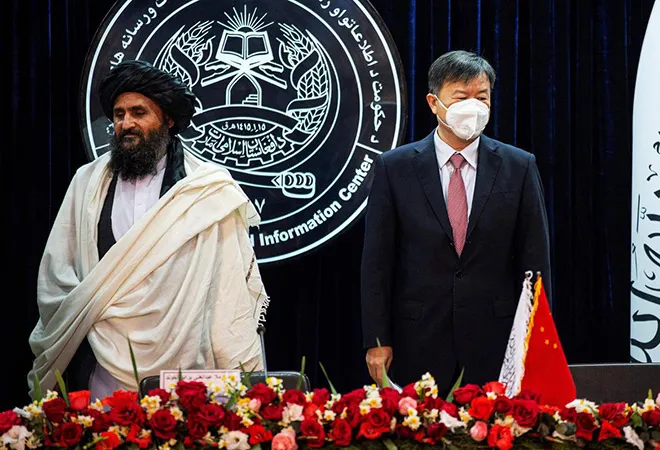
When most of the major powers have embraced the new mantra of “wait and watch” the Taliban, the small South Asian powers have also reacted to the Taliban’s takeover in a similar manner.
The Foreign Minister of Bangladesh stressed that it was too early to comment on the Taliban’s takeover and its recognition, and will decide based on how the situation develops. However, it was also made clear that Bangladesh is carefully monitoring the situation and would only be willing to work with the new government if it is democratic and people supported.
A similar stance was taken by the Sri Lankan government, which expressed that it is concerned and closely observing the crisis in Afghanistan that might lead to an extremist safe haven and trigger concerns of migration and illicit narcotics throughout the region. However, it did hope that the Taliban would abide by its amnesties and promises of not harming any foreigners, and will safeguard and uphold human and women rights.
Bangladesh is carefully monitoring the situation and would only be willing to work with the new government if it is democratic and people supported.
Likewise, in an official statement, the Ministry of Foreign Affairs of Nepal urged for lasting peace in the country. But officials also spoke of maintaining a ‘neutral position’ on the issue for now and emphasised on deciding as the situation unfolds and how the world responds to it. Finally, although the Maldives hasn’t issued an open statement, its officials have asserted that the government hasn’t made any decision on the Taliban government yet.
Broadly, these small South Asian states have also embraced a “wait and watch” policy on the Taliban. While this reaction was expected from regional and global powers, this unusual stance from the small states can be explained with three calculations: Internal security, domestic politics, and external factors.
Internal Security:
The fall of Afghanistan to the Taliban has resurfaced several anxieties of terrorism and internal unrest for South Asian nations. The Taliban’s close relations with various terror outfits and its incapability to govern the whole of Afghanistan will provide a safe haven and space for various terror outfits; thus, contributing to radicalisation, terrorist training and funding, and illicit weapon and drug exports. This inevitably acts against the national interests and integrity of the smaller South Asian nations.
To substantiate, Bangladesh has had a history of its citizens fighting and training alongside the Mujahidin, the Taliban, and al-Qaeda. Most of these fighters even returned home to train and radicalise the Bengali youth and the refugee-seeking Rohingyas. This has led to the creation of significant and dreadful terrorist organisations such as Harkat-ul-Jihad-al-Islami (HuJI-B) and Jamaat-ul-Mujahideen Bangladesh (JMB). With most of their activities now being limited, there is a potential for the re-emergence and re-energising of these terrorist organisations with the Taliban takeover. This seems more evident with several Bangladeshis now travelling to Afghanistan to support various terrorist organisations.
A similar set of challenges confront Sri Lanka. The last time the Taliban ruled over Afghanistan, it had created a deep network of illicit drug, finance, and weapons networks amongst several south Asian terrorist and separatist organisations, including the LTTE. This had created a huge boost for the LTTE in terms of weapons and finance, which even lasted after the defeat of the Islamic Emirate in 2001. Thus, the re-emergence of the Taliban with more advanced weapons and supply of drugs, at a time when Sri Lanka is witnessing an increase in Islamic terror, Sinhala-Muslim differences, and speculations of revived Tamil separatism has triggered huge anxieties for Sri Lanka.
Similarly, for the Maldives, which has the highest per capita foreign terrorist fighters who fought alongside al-Qaida, ISIS, and other terrorist organisations. It will now find Afghanistan a hotspot for reviving their activities. This, with the trend of increase in home-grown terrorist attacks, will pose severe security challenges to the Maldives.
The re-emergence of the Taliban with more advanced weapons and supply of drugs, at a time when Sri Lanka is witnessing an increase in Islamic terror, Sinhala-Muslim differences, and speculations of revived Tamil separatism has triggered huge anxieties for Sri Lanka.
Thus, it is against this backdrop that most of these smaller states are maintaining a “wait and watch” policy against the Taliban. But this stance is not free of domestic politics either.
Domestic politics
For Bangladesh, which has been long divided in terms of secular and Islamic nationalism, its current Prime Minister Sheikh Hasina has begun accommodating Islamist demands and pressures, trying to maintain some balance between her secular and Islamic vote base. This has become more crucial as her hard-line approach against the Islamists and extremist ecosystems have continued to create a perception of her being ‘anti-Islam’. Thus, it is highly unlikely that Sheikh Hasina’s government will embrace a policy against the Taliban and sections of Bangladeshi sympathisers unless they pose a real threat to the state’s security.
Similarly, for most of Sri Lanka, the scars that the Taliban had left with the Bamiyan Buddha blasts continue to prevail. In this context, the Taliban would hardly make any progress beyond being seen as a terrorist organisation. This places the Rajapaksas and their party in a difficult position, as their vote base is composed of hard-line Buddhists bent on building a Sinhala majoritarian state. In fact, it was the same hopes of the Rajapaksas safeguarding the Sinhala Buddhists from extremist attacks and ideology that led to their victory in the first case. Thus, any move that might recognise the Taliban for now, would exacerbate the governments’ costs over benefits.
The ruling party, the Maldivian Democratic Party, which has been perceived as ‘anti-Islam’ for its criticism of hard-line Islam, is seeing a gradual transformation.
On the other hand, the gradual entrenchment and acceptance of the Sunni Salafi Islam within the Maldives and the intertwining of religion with the national identity have posed a new challenge for the government. In this context, the ruling party, the Maldivian Democratic Party, which has been perceived as ‘anti-Islam’ for its criticism of hard-line Islam, is seeing a gradual transformation. The current government is, thus, seeking support from the conservative and religious opposition parties, having realised their emerging prominence. The disposal of the new proposed hate crimes bill is just an example of this growing phenomenon. Thus, the Maldives has been in no hurry to accept or reject the new Sunni rulers of Afghanistan.
But, in addition to these factors, the external forces have also played a major role in determining this “wait and watch” policy.
External factors:
A primary factor is India’s recognition and interaction with the Taliban. Although India’s neighbours have shown some sensitivity for India’s terrorism concerns, this sensitivity will intensify in the future with China’s coerciveness and debt-trapping and India’s leading role in regional connectivity. Hence, the small states would want to pursue a policy on the Taliban and terrorism that doesn’t trigger security concerns or have spill-over effects for India. This might be important, as these differences had strained their relationship with India in the past, as seen with Nepal after the Kandahar hijack and Bangladesh in the early 2000s due to cross-border terror attacks.
Secondly, in recent years, China has made inroads within South Asia, as an alternative trade and development partner to India. Thus, China’s recognition of the Taliban or the extension of its investments and Belt Road Initiative (BRI) to Afghanistan would make it an easy point of attraction for landlocked states such as Nepal, which have been trying to discover new markets and reduce their dependence on India. Further, a close relationship between China, Afghanistan, and Pakistan, will influence the Taliban policy of the South Asian states, through certain incentives from China and Pakistan and pressures from India. Hence, the small states will be keen to make their decision based on this evolving regional structure.
China’s recognition of the Taliban or the extension of its investments and Belt Road Initiative (BRI) to Afghanistan would make it an easy point of attraction for landlocked states such as Nepal, which have been trying to discover new markets and reduce their dependence on India.
Finally, with the revived significance for the smaller South Asian states from the US under the broader Indo-Pacific strategy, these states will use the former to balance other regional powers – India and China. Now, this bargaining leverage and importance for the small states will further increase if China manages to bring the Taliban under their sphere of influence. Hence to ensure their bargaining and balancing leverage, these small states will consider the US’s stance on the Taliban to shape their policies.
It is thus evident that these small South Asian states have adopted a “wait and watch” policy to reap concessions for their interests and concerns on internal security, domestic politics, and external factors, as the great game in Afghanistan continues to unfold.
The views expressed above belong to the author(s). ORF research and analyses now available on Telegram! Click here to access our curated content — blogs, longforms and interviews.




 PREV
PREV


